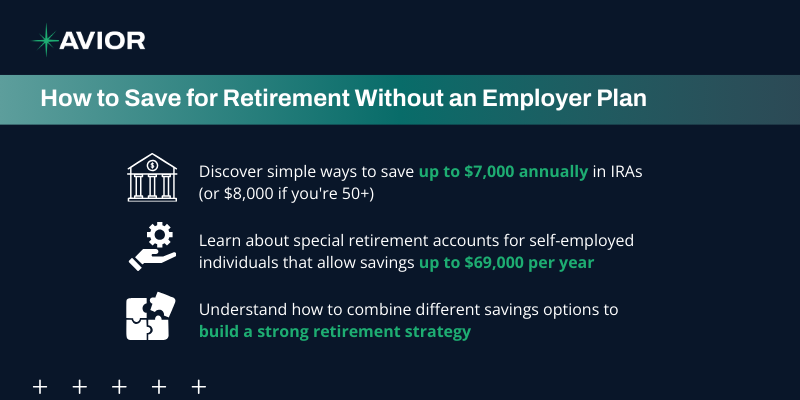How to Save for Retirement Without an Employer Plan

Many workers today don’t have access to employer retirement plans – in fact, over 40% of American workers are in this situation. Whether you’re self-employed, working in the gig economy, or employed at a company without retirement benefits, building your retirement savings might feel challenging. Don’t worry though – you have plenty of powerful options to create a secure financial future.
Think of building retirement savings like constructing a house. Without an employer plan, you’re simply using different building materials, but the end goal remains the same: creating a strong financial foundation for your future. This guide walks through your best options and shows exactly how to put them to work.
Starting With Individual Retirement Accounts (IRAs)
Individual Retirement Accounts serve as the foundation of retirement saving for people without employer plans. These accounts offer significant tax advantages and flexibility in investment choices. Traditional IRAs reduce your taxes now by letting you deduct contributions from your current income, while Roth IRAs offer tax-free growth for retirement.
For 2025, you can contribute up to $7,000 to IRAs ($8,000 if you’re 50 or older). While you can have both types of IRAs, your total contributions across all IRA accounts can’t exceed these annual limits. Keep in mind that income limits may affect your ability to contribute to a Roth IRA or deduct traditional IRA contributions.
Powerful Options for Self-Employed Individuals
Self-employed individuals actually have access to some of the most generous retirement saving options available. The Solo 401(k) stands out as particularly powerful, allowing you to contribute both as an employer and employee. This dual contribution ability means you could potentially save up to $69,000 annually in 2024.
Another excellent option is the SEP IRA, which offers simpler administration but only allows employer contributions. Both plans provide valuable tax deductions, helping reduce your business’s taxable income while building your retirement savings.
Expanding Your Retirement Strategy with Additional Savings Vehicles
Beyond traditional retirement accounts, smart savers often leverage multiple savings vehicles to strengthen their financial future. Health Savings Accounts (HSAs) stand out as particularly valuable tools, offering a unique triple tax advantage: tax-deductible contributions, tax-free growth, and tax-free withdrawals for medical expenses. When combined with a high-deductible health plan, an HSA becomes a powerful supplement to your retirement savings.
Taxable brokerage accounts also play an important role in a well-rounded retirement strategy. While they don’t offer the same tax benefits as retirement accounts, they provide valuable flexibility – you can withdraw funds anytime without penalties. This flexibility makes them perfect for bridging the gap if you need to retire before reaching traditional retirement account withdrawal ages.
For stability and inflation protection, government bonds deserve consideration in your portfolio. Meanwhile, high-yield savings accounts serve as ideal homes for emergency funds, ensuring you won’t need to tap into your retirement savings for unexpected expenses.
Creating Your Strategic Savings Plan
Building a successful retirement savings strategy without an employer plan requires thoughtful planning and consistent execution. Start by maximizing your IRA contributions – this forms your saving foundation. If you qualify for an HSA, make it your second priority due to its exceptional tax benefits.
Once you’ve maximized tax-advantaged accounts, direct additional savings into taxable investments. The key to success? Automation. Set up automatic transfers from your checking account to your various savings vehicles on paycheck days. This simple step removes emotion from the equation and ensures consistent saving habits.
Most importantly, schedule annual reviews of your investment strategy. Markets change, your life circumstances evolve, and your portfolio needs regular rebalancing to stay aligned with your goals. Mark your calendar for a yearly financial check-up every January.
The Power of Professional Guidance
Navigating retirement planning without an employer plan adds complexity to your financial life. A qualified financial advisor can provide invaluable assistance in optimizing your strategy. They help identify tax-saving opportunities, manage investment risks, and ensure your retirement plan stays on track through regular reviews.
Professional guidance becomes particularly valuable when considering insurance needs and risk management. An advisor can help determine appropriate coverage levels for life, disability, and long-term care insurance – critical components of a comprehensive retirement strategy that many people overlook.
Work With Us
Planning for retirement without an employer plan requires initiative and strategic thinking, but you don’t have to figure it out alone. The strategies outlined above – from maximizing IRA contributions to leveraging HSAs and creating a diversified investment approach – provide a solid framework for building long-term financial security. Success comes from choosing the right combination of tools and maintaining the discipline to use them consistently.
At Avior, we specialize in helping independent savers create purposeful retirement strategies that align with their unique circumstances and goals. Our team can help you navigate the complexities of retirement planning, optimize your tax strategy, and build a robust financial future – with or without an employer plan. Contact Avior today to schedule a consultation and start building your personalized retirement roadmap to weather inflation’s challenges and help maintain your desired lifestyle throughout your golden years.
Disclaimer: Nothing contained herein should be construed as legal or tax advice. Avior and our Advisors will work with your attorney and/or tax professional to assist with your legal and tax strategies. Please consult your attorney or tax professional with specific legal and/or tax questions. Investment Management and Financial Planner are offered through Avior Wealth Management, LLC, an SEC-registered investment advisor. Past performance is not a guarantee of future results. Investments are subject to loss, including the loss of principal.
No Comments
Sorry, the comment form is closed at this time.




